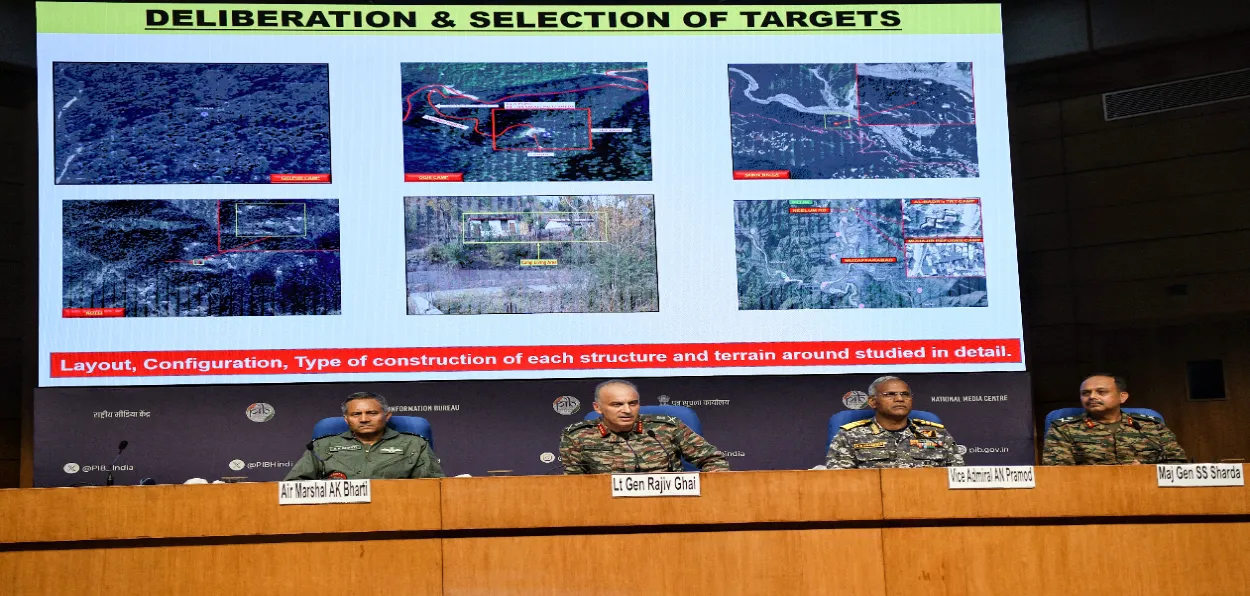
New Delhi
Director General Military Operations (DGMO) Lieutenant General Rajiv Ghai on Sunday said Indian Armed Forces used caution not to target civilian establishments and remained bound by self-imposed restrictions to target only terrorists and later military installations in Pakistan during Operation Sindoor.
Hinting at higher causalities on Pakistani side, Air Marshal A K Bharti, Direction Operation of Air Force however quipped in reply to a question, “Our aim was not to inflict casualties, but in case there have been, it is for them to count. Our job is to hit the target, not to count the body bags."
"How many casualties? How many injuries? Our aim was not to inflict casualties, but in case there have been, it is for them to count. Our job is to hit the target, not to count the body bags," the Air Marshal said , when asked about the loss of lives to the Pakistan Army.
Briefing media on the Operation Sindoor on Sunday evening, General Ghai said at least 35 Pakistani army personnel were killed on the Line of Control (LoC) between May 7 and 10, during Operation Sindoor. He said “there would be more casualties, which are being assessed, since the Indian army used heavier weapons in response to air intrusions by the neighbouring country's army.”
"There are various means to ascertain (the loss of lives). There is information from various agencies. From the Line of Control (LoC), there are other ways to determine the effects. I mentioned 35-40 on the Line of Control. Please remember that once Operation Sindoor was launched, the responses of the Pakistan Army were also on the Indian Army or the Indian Armed Forces infrastructure,” Ghai told reporters in a press conference.
“Our targets were terror-oriented, and later, once they launched air intrusions and air operations on our infrastructure, we used heavier weapons, and there would have been casualties, but those are still being assessed,” he added.
The DGMO said that some of the air fields and dumps witnessed repeated attacks in waves from the air, which was prevented by the armed forces.
"Some of the air fields and dumps saw repeated attacks in waves from the air. All were thwarted. The Pakistan Army has reported to have lost approximately 35 to 40 personnel in artillery and small arms firing on the Line of Control between May 7 and 10," Ghai said.
The DGMO said that Muridke, a city in Sheikhupura district of Pakistan’s Punjab, has been the hub of Lashkar-e-Taiba, which has bred infamous characters such as Ajmal Kasab and David Headley, accused in the 26/11 Mumbai terror attacks.
“There was also a term of reference and our own binding self-imposed restriction to target only terrorists and thus, prevent collateral damage. There were nine camps you are now familiar with, which were confirmed by our various intelligence agencies to be inhabited. Some of these were in PoJK, while there were others that were located in the Punjab Province in Pakistan. Nefarious places such as Muridke, the hub centre of the Lashkar-e-Taiba, have over the years bred infamous characters such as Ajmal Kasab and the likes of David Headley,” Ghai added.
Opration Sindoor was launched on May 7 to strike multiple terror sites in Pakistan and Pakistan-Occupied-Kashmir after a deadly attack in Jammu and Kashmir's Pahalgam last month in which 26 tourists were killed.
Air Marshal Bharti, who refrained from disclosing the nature of weapons used by Indian armed forces he said, “whatever methods and means were chosen had the desired effects on the enemy targets."
DGMO Lt. Gen. Rajeev Ghai said that more than 100 terrorists, including those involved in the 1999 Indian Airlines flight (IC-814) hijacking, and the 2019 Pulwama terror attack, were eliminated in the precision strikes carried out by the armed forces in Pakistan and Pakistan-Occupied Kashmir (PoK) under Operation Sindoor.
He said that Operation Sindoor was conceptualised with a precise military aim to "punish the perpetrators and planners of the Pahalgam terror attack."
"Operation Sindoor was conceptualised with a clear military aim to punish the perpetrators and planners of terror and to destroy their terror infrastructure. What I do not state here is the often stated determination of India and its intolerance to terror," Ghai said in a press conference here.
The Indian strikes killed "high-value targets", namely, Yusuf Azhar, Abdul Malik Rauf and Mudasir Ahmed, who were involved in the hijacking of IC 814, popularly known as the Kandahar hijack, and the Pulwama attack, where 40 CRPF jawans were killed in 2019.
"Those strikes across those nine terror hubs left more than 100 terrorists killed, including high-value targets such as Yusuf Azhar, Abdul Malik Rauf and Mudasir Ahmed, who were involved in the hijack of IC814 and the Pulwama blast," the DGMO added.
Ghai also informed that the Indian Air Force and the Indian Navy played a "major part" in these strikes.
DGMO Ghai said that the brutal Pahalgam terror attack and the "numerous other" such attacks on armed forces and defenceless civilians prompted India to make a "compelling statement of our resolve as a nation" against terrorism.
READ MORE: Ops Sindoor: India establishes decisive strategic edge over Pakistan
"You are all by now familiar with the brutality and the dastardly manner in which 26 innocent lives were prematurely terminated at Pahalgam on April 22. When you combine those horrific scenes and the pain of the families that the nation witnessed with numerous other recent terrorist strikes on our armed forces and defenceless civilians, we knew that the time had arrived to make yet another compelling statement of our resolve as a nation," he said.
